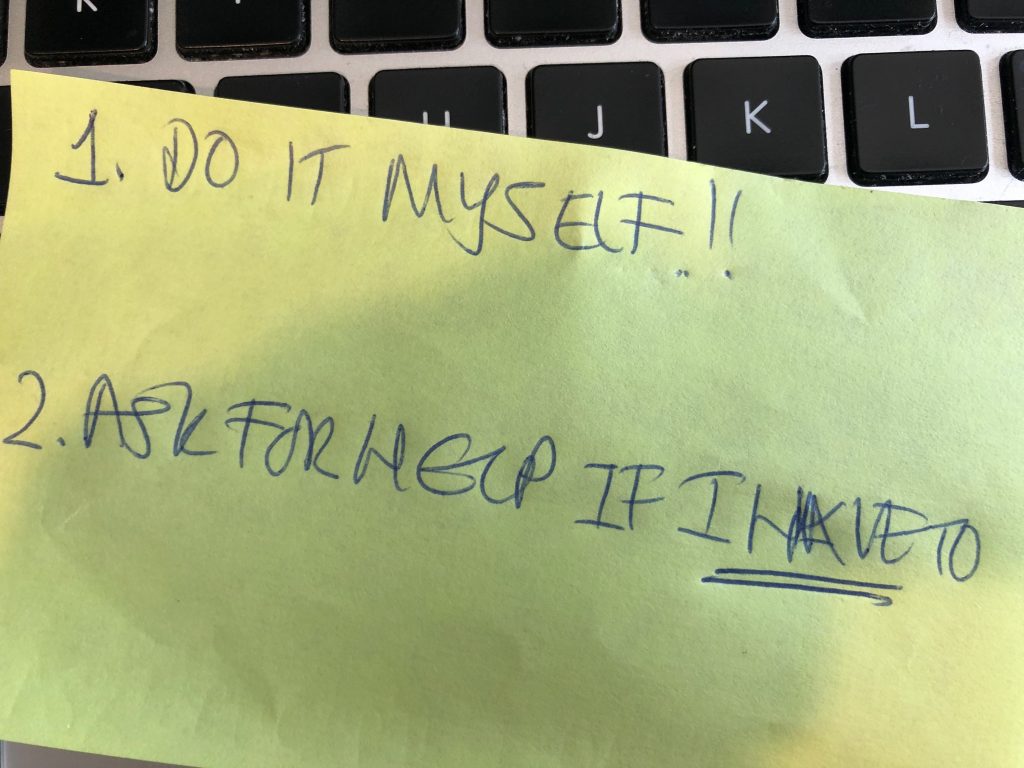If you don’t ask for help, you won’t get any
Asking for help is a strength

If you don’t ask for help, you won’t get any
Acting alone is high risk
We come into this World alone. We are brought up to be independent. We are encouraged to find the solutions to our own problems. We are told not to be weak. We are only answerable to ourselves. This kind of independence mindset can give us inner-strength and resilience, but it can stop us asking for help when we need it. And we should ask for help. If you don’t ask for help, you won’t get any. Acting alone is high risk.
If we were truly independent, we couldn’t ever be wrong unless we decided that for ourselves. And yet, we can be wrong, because we are not the only judges of our own behaviours and performances. We are not truly independent. As I’ve written before, no one truly does anything alone. We are a part of society. We already rely on hundreds if not thousands of other people. We are surrounded by people who are full of knowledge, experience and skill. How we interact with them is up to us.
Avoiding mistakes comes from taking active steps to avoid them, rather than ignoring them and hoping that no-one notices. Sticking our heads in the sand merely delays the inevitable. Wisdom is what helps decision-making. Wisdom comes from being knowledgeable, well-informed and well-educated about all the relevant issues. Which of us knows everything about everything already? All the traits of wisdom are learned directly or indirectly from other people.
Help is not a four letter word
So why don’t we ask for help more? For a start, no one wants to look incompetent. No one wants to be professionally embarrassed. Being unsure can show weakness. Getting something ‘wrong’ can be perceived to be failure. Even if the feedback is useful, having to change something is a hassle. The status quo is fine already. If it isn’t broken why try to fix it? All of this builds a wall of fear and doubt. It can become so large that no one wants the grief that comes from asking other people for their opinions. This path of fear leads us to inertia and inaction. It’s much easier not to ask for help, just in case it shows you up, or makes you do something new and uncomfortable. So let’s not bother?
But we should bother. Refusing to seek help is more about personal pride than logic or pragmatism. Why would anyone willingly choose to weaken their own performance? And yet people do undermine their organisation’s success, by not seeking help when it’s needed, in order to try and protect their own reputations. That’s despite knowing the potential upside of the additional information, ideas and experience that other people can offer us. If you don’t take risks you’ll probably keep your job, until it turns out you should have taken more risks.
Ironically it’s the attitude of independence that risks the very thing we’re afraid of. The less understanding there is behind a decision, the more likely it is actually wrong. The more homogeneity amongst the decision-makers, the narrower the thinking will be. The more cognitive diversity there is about the issues, the more likely the decision will be a good one.
Help may be a four letter word, but it’s not a rude word. Asking someone with relevant experience to share that experience isn’t weak. It’s the opposite. It’s clear evidence of a strong focus on delivering the purpose and mission. Ruling people out of the decision-making process, because they ‘probably’ don’t know more than you do, is just help avoidance. If in doubt, why not ask them what they know? If you don’t ask, you often don’t get.
Everyone knows something that you don’t know. Most people will happily share their knowledge and experience with you. People are often delighted to be asked. And with that additional wisdom, your organisation can make better decisions.
Question the big picture
When deciding what your organisation needs, start with your purpose and mission, rather than with the status quo. Protecting what you’ve got only makes sense if that’s your mission. All your decision-making should be focused on achieving your goals. For example, if you want your organisation to offer amazing customer service and it’s currently a bit patchy. Is the status quo good enough? Are the current systems working? If not, is the current decision-making good enough? Why not try bringing an extra dimension into your thinking process.
If you want your products to be market leading and they’re actually mid-range, is your research and development process as good as it needs to be? If not, is the current decision-making behind them good enough? Why not add an extra dimension into your thinking process.
If you don’t ask for help, you almost certainly won’t get any. And if you don’t have the feedback you need, you might make a wrong decision and then another one.
Inclusion brings knowledge. Diversity brings understanding. Asking brings wisdom.
